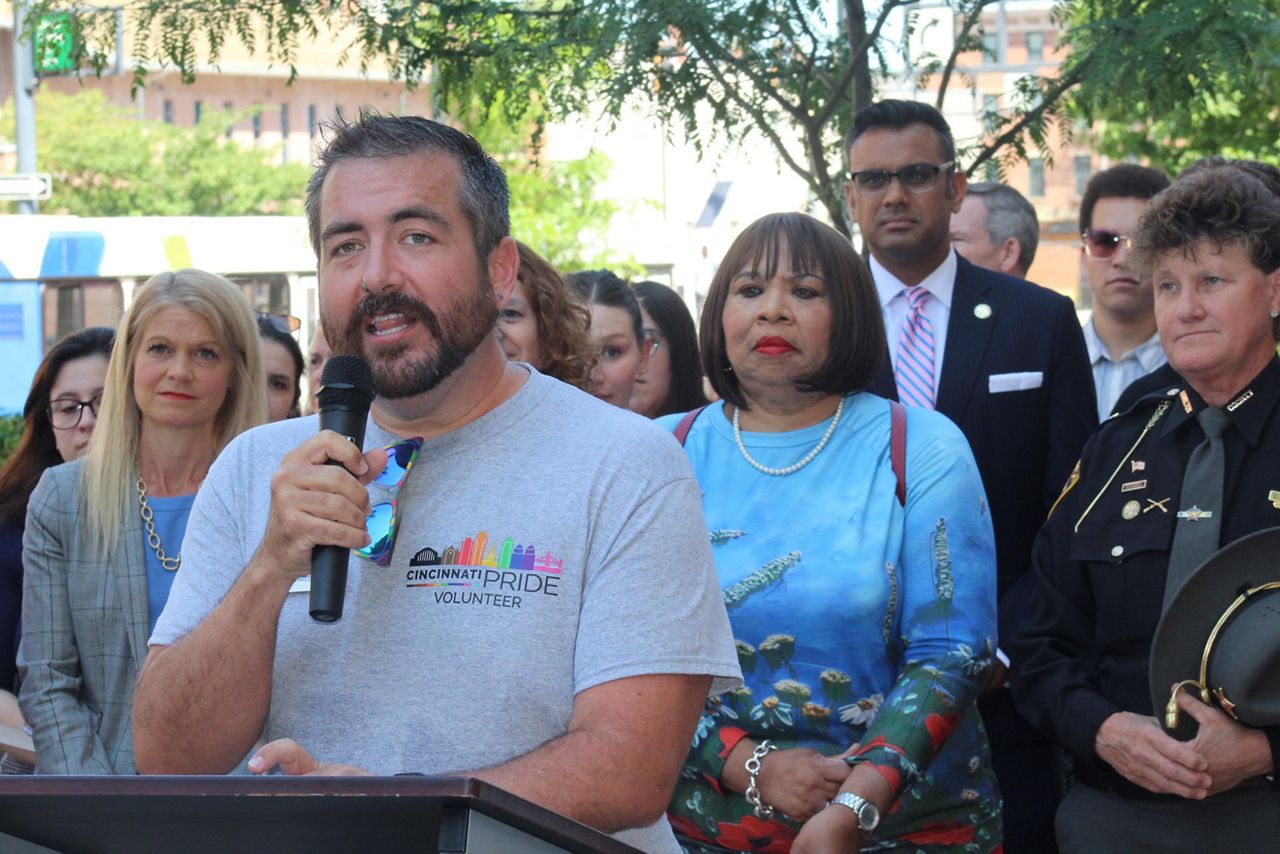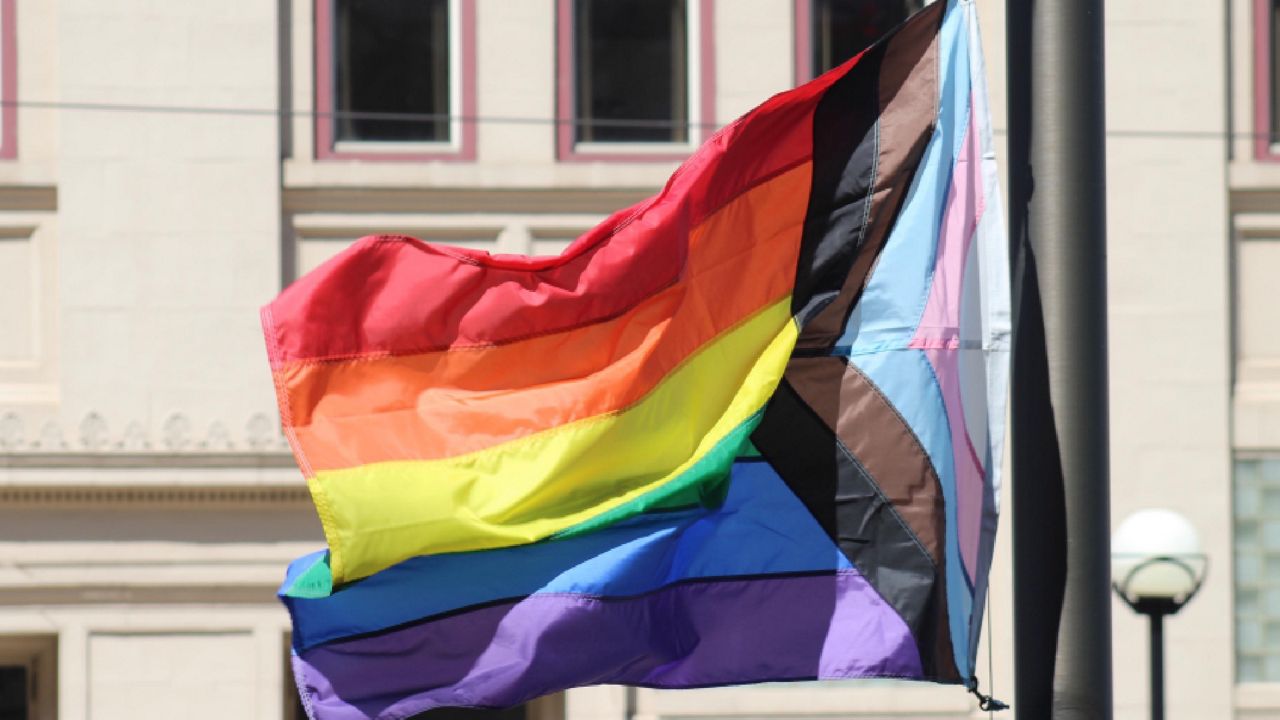CINCINNATI — The City of Cincinnati and Hamilton County raised Pride flags at their government buildings on Thursday as the state of Ohio continues to grapple with legislation and other actions some view as anti-LGBTQ+.
Thursday marked the official start of Pride Month. Typically held in June, Pride celebrates and commemorates the contributions of lesbian, gay, bisexual, transgender, queer and other people who fall under the LGBTQ+ umbrella. It’s also a day to remind people of the ongoing challenges that face the community.
Harris referred to the “queer origins” of Pride more than five decades ago as a protest against intolerance. The first Pride in 1970 addressed centered on police brutality a year earlier at a small New York City bar called the Stonewall Inn.
“As we continue to face legislative attacks on the (LGBTQ+) community from the statehouse and nationally, it is critical that we as a city loudly proclaim that we are a welcoming, inclusive, and affirming place to live,” Harris said during the flag-raising outside City Hall.
Joining Harris, the lone openly gay member of City Council, Thursday morning were four of his Council colleagues, the city manager, members of city staff and more than two-dozen advocates and allies.

A few blocks away across downtown Cincinnati, a group of county officials gathered outside Hamilton County Courthouse to raise the Pride flag. This is the fifth straight year the county has raised the flag, but the first time they’ve held an event.
The county plans to hoist Pride flags at all of its buildings and properties throughout the month of June.
Commissioner Denise Driehaus said Hamilton County and the city held joint events to show “solidarity.” She noted being asked why they need to raise the flag in 2023, given the perceived progress in recent years.
The answer is simple, she said: “We want to let people know everyone is welcome in Hamilton County and Cincinnati.”
Among those in attendance at both events was Dustin Lewis, director of programming for Cincinnati Pride. The organization coordinates many of the Pride month events, including the parade and all-day festival on Saturday, June 24.
“They’re standing with us in solidarity,” Lewis said of the show of support from elected officials in downtown Cincinnati on Thursday.
Lewis, 40, has lived in Cincinnati off and on for 25 years. He’s seen Cincinnati become a more loving, accepting and inclusive place.
“Looking at our past as a community — as a county, as a city — I think acknowledging and recognizing how much progress we’ve made to create inclusion and create spaces where people feel safer,” he added. “The raising of the flag is a symbolic indicator of where Cincinnati is today.”
Lewis credits changes to “new blood” both in the city and at City Hall. That shift has helped lead to the creation of City Pride, a resource group for LGBTQ+ employees.
The group came about a few years ago to make the workplace more welcoming, said Sue Magness, the group’s co-chair.
Throughout the year, City Pride hosts a mixture of lunch-and-learn educational events, where they discuss topics ranging from specific health issues to coming out. One of their current projects is working to create safe spaces so people can feel comfortable being more visibly out at work.
The group is also responsible for organizing a contingency from city departments to take part in the Pride parade.
“We’re about helping employees feel comfortable being their whole, authentic selves at work,” Magness said.
The city also raised the Transgender Pride flag on Thursday. They couldn’t do it on International Transgender Day of Visibility because it got rained out. The flag will remain up through the rest of the week, Harris said.

While the Transgender Pride flag was a rain check of sorts, it’s also a fitting time to address the issue, Harris said, given “attacks” against transgender people by elected officials at the Statehouse in Columbus.
Jen Scott, with Equality Ohio, referenced recent pushes to ban transgender athletes in sports and address bathrooms a person uses. One of the biggest current threats, she said, is House Bill 68.
Unveiled in February, the “Ohio Save Adolescents from Experimentation Act” bill would prevent transgender youth from accessing gender affirming health care.
The primary sponsor of the legislation is State Rep. Gary Click, R-Vickery. The bill has 39 co-sponsors, all of whom are Republican.
Click described HB 68 as “common sense legislation” that’s designed to “protect children experiencing gender identity disorder” until the age of 18.
The bill aims to ban surgeries and prescriptions of puberty-blocking drugs and cross-sex hormones to patients to minors. If passed, the law would also require a physician would need to get parental consent and screen the patient for abuse, depression and “other mental health conditions” before treating them for a gender-related condition.
Joining Click in February to announce the bill was a mother of a transgender-identifying child and trans man. Both spoke to support the bill.
“Gender dysphoria has nothing to do with who you love,” said Click. He stressed that the issue was brought to him by a same-sex couple whose daughter was having some “confusion” about their gender.
“Her mother said, ‘We will not put her on chemicals and hormones and puberty blockers that are going to do harm. When she gets older, if that’s what she wants to do and she’s able to understand it and comprehend it, then she can do as she pleases,’” he said.
“We’re not worried about social transitions or pronouns,” he said. “This bill is about a medical treatment that harms young people.”
He emphasized that bills about barring bathrooms are about “protecting privacy” and barring transgender athletes from sports is about “fair competition.”
He said people like to push the narrative that this is based on “hate,” but he referred to it as “a lot of people who just want to protect kids.”
Lewis didn’t buy that assessment. He said elected officials, namely Republicans, continue to use those who identify as LGBTQ+ as “political pawns” and “use scare tactics” about issues facing that community to “get voters to the polls.”
“By celebrating and acknowledging Pride, by gathering together, we continue to resist and persist,” he added. “We continue to say we’re here and we’re not going anywhere. You can debate and discuss whatever you’d like, but you can’t take away our humanity or who we are as people.”
The issue surrounding health care for transgender is personal for Council member Mark Jeffreys. He’s the parent of a 22-year-old who came out as transgender last year. They live in Massachusetts and have “no desire to come back to Ohio,” Jeffreys said, because of the environment the state created for gay and transgender people.
“It concerns me when I hear them talk about going to the bathroom in a public place and hearing for their physical safety,” he said.
While Cincinnati can’t do anything else taking place in Ohio or around the world, the city can serve as a “beacon of hope in the sea of hate,” Jeffreys said. He called Cincinnati an “oasis” amid growing hate and "dark times" in Ohio and elsewhere.
“We are proud that Cincinnati is a place where everyone feels safe being who they are,” he said.




